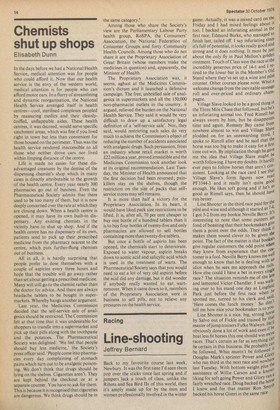Chemists shut up shops
Elisabeth Dunn
In the days before we had a National Health Service, medical attention was for people who could afford it. Now that our health service is the envy of the western world, medical attention is for people who can afford motorcars. In a flurry of streamlining and dynamic reorganisation, the National Health Service arranged itself in health centres—cool, sterilised complexes peopled by reassuring medics and their cleanlytoiffed, unflappable aides. These health centres, it was decreed, would serve specific catchment areas, which was fine if you lived right in town but less than convenient for those housed on the perimeter. Thus was the health service rendered inaccessible to all those who neither drove cars nor • lived within limping distance of the centre.
Life is made no easier for these disadvantaged creatures by the demise of the dispensing chemist's shop which in many cases is directly attributable to the growth of the health centre. Every year nearly 300 pharmacies go out of business. Even the Pharmaceutical Society admits that there used to be too many of them, but it is now deeply concerned over the rate at which they are closing down. When a health centre is opened, it may have its own built-in dispensary. Any existing chemists in the vicinity have to shut up shop. And if the health centre has no dispensary of its own, patients tend to pick up their prescribed medicine from the pharmacy nearest to the centre, which puts further-flung chemists out of business.
All in all, it is hardly surprising that people prefer to dose themselves with a couple of aspirins every three hours and hoe that the trouble will go away rather than set about getting a prescribed medicine. Many will still go to the chemist rather than the doctor for advice. And there are always headache tablets to be bought in supermarkets. Whereby hangs another argument.
Last year, the Medicines Commission decided that the self-service sale of analgesics should be restricted. The Commission felt at that time that it was undesirable for shoppers to trundle into a supermarket and pick up their pills along with the toothpaste and the potatoes. The Pharmaceutical Society was delighted: 'We feel that people should buy less medicine,' the Society's press officer said. 'People come into pharmacies every day complaining of stomach pains, which turn out to be analgesic poisoning. We don't think that drugs should be lying on the shelves. Cigarettes aren't. They are kept behind the checkout or at a separate counter. You have to ask for them. This is because it is recognised that cigarettes are dangerous. We think drugs should be in the same category.'
Among those who share the Society's view are the Parliamentary Labour Party health group, RoSPA, the Consumers' Association, the National Federation of Consumer Groups and forty Community Health Councils. Among those who do not share it are the Proprietary Association of Great Britain (whose members make the medicines in question) and, apparently, the Minister of Health.
The Proprietary Association was, it seems, aghast at the Medicines Commission's dictum and it launched a defensive campaign. The free, unbridled sale of analgesics in supermarkets and all the 150,000 non-pharmacist outlets in the country, it argued, relieved the burden on the National Health Service. They said it would be very difficult to draw up a satisfactory legal definition of a 'self-service sale'. Nor, they said, would restricting such sales do very much to achieve the Commission's object of reducing the number of accidents associated with analgesic drugs. Such persuasion, from an industry whose retail market is worth £22 million a year, proved irresistible and the Medicines Commission took another look at its original recommendation. Last Tuesday, the Minister of Health announced that the first decision had been reversed; painkillers stay on the shelves, though the restriction on the size of packs that selfservice stores may sell remains.
It is more than half a victory for the Proprietary Association. In its heart, it would have liked pack size restrictions to be lifted. It is, after all, 70 per cent cheaper to buy one bottle of a hundred tablets than it is to buy four bottles of twenty-five and only pharmacists are allowed to sell bottles containing more than twenty-five tablets.
But once a bottle of aspirin has been opened, the chemicals start to deteriorate. Exposed to water vapour, aspirin breaks down to acetic acid and salicylic acid which is used in the treatment of warts. The Pharmaceutical Society says that you would need to eat a lot of very old aspirin before the acid did any damage, but it did wonder if anybody really wanted to eat wartremover. When it came down to it, members of the Proprietary Association, were in business to sell pills, not to relieve any pressures on the health service.


































 Previous page
Previous page